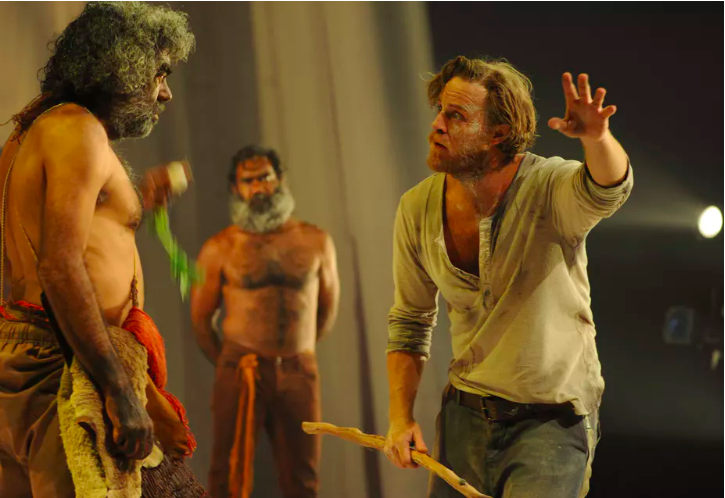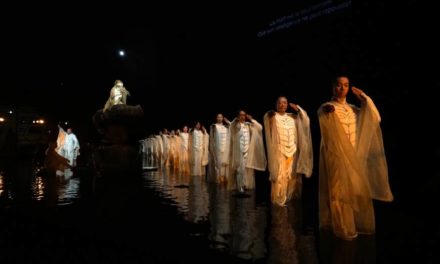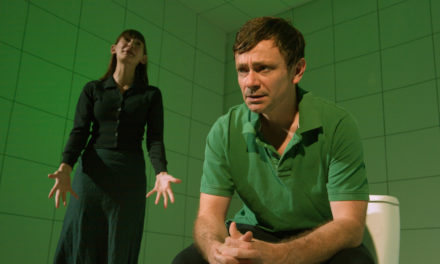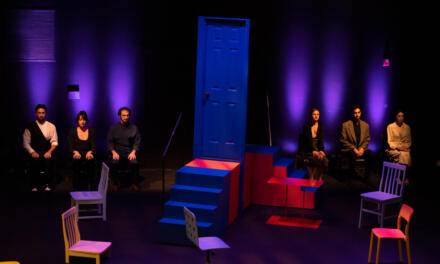Last year in Australian theatre a rare event took place: a sector-wide debate about the role of classic adaptations in the national repertoire. But the discussion had darker resonances and was clearly about more than programming balance.
In my Platform Paper, The Retreat Of The National Drama, published today, I try to define the term “adaptation” and clarify the context of its application today. This exercise in intellectual hygiene, however, is unlikely to mollify the debate’s combatants, angry and perplexed on the one hand, blithe and overruling on the other. For this is not, in the end, an argument about plays, old or new. It is about the expectations Australian artists and audiences have of one another, and Australian artists have of themselves.
These are to some extent historically determined and, while practitioners are free to imagine impossible theatres, it is the possible ones that find favor and funding.
Because the play script is for many companies an Archimedean point in the theatre-making process its choice is significant. A season of plays reflects a stance by artists towards the world. Audiences may confirm this stance or not, but within limits. However sensitive they claim to be to patron demand, artists still use their specialized knowledge to make informed judgments about the repertoire.
Not only the plays selected for production but the type of plays selected is of intense interest. The invisible categories of sense (the “slots”) that hover over individual scripts and push them forward as potential stage experiences, shape – or break – hopes and careers.
That adaptations have an illegitimate side is not provable in a scientific sense. For a country such as Australia, however, with a fragile cultural ecology and a history of colonial domination, setting limits on foreign imports is both wise and necessary. But this negative critical point is far, far less important than the positive argument that it is time for Australians to acknowledge that a fully functioning national drama is not a gold-taps luxury but a vital component of civic maturation.
Why Theatre?
For all the much-vaunted advances in mixed-media performance, there is nothing like saying it. Words retain their dominant hold over our fund of knowledge and experience.
Indeed, the core of the adaptations issue is a dispute about which words on our stages we should be hearing. And while there is enjoyment and edification to be had from the historical repertoire, our relationship with the past makes sense only in terms of our relationship with the present. New play development puts the canon to the question and provides a standpoint from which to view it as something more than a parade of opportunistic product.
This might not be immediately obvious. When a show in the theatre “works” and fills us with a sense of energized participation, why hanker for something more? For something that doesn’t “work” or not in the same way?
Why pursue a corpus of plays that can be brought into being only with difficulty, uncertainty, and effort, rather than identifying “the best” drama has to offer and sticking with that? Because there comes a time in the life of a people, as there does in an individual, when articulating a response to a changing world becomes more pressing than a need for assured success.
Drama is an incomparable way of freighting life experience. Drama — and I include film, television and digital media — assays what American critic Lionel Trilling called a nation’s “secret life”. German Expressionism after the first world war, British Absurdism in the 1950s, and New Wave theatre in Australia in the 1970s, all made subcutaneous thoughts and feelings available in stage form.
Drama is an unparalleled method of account, a trackless ship of the imagination. It is the courtroom, marketplace, street corner, bedchamber, battlefield, dreamscape, garden of Eden, fiery hell; a furious, funny, prescient means of telling ourselves things we don’t want to know but need to know.
Drama’s benefits are thus considerable and extend well beyond the theatre, an art form most Australians regard as elite, antique or affected. Nevertheless, the live stage remains drama’s proving ground.
When David Hare’s Stuff Happens premiered at London’s National Theatre in 2005, so great was the shock at seeing George Bush portrayed as a canny leader, and Tony Blair as a fool, that it changed perceptions of the second Iraq war and probably UK public policy as well.
The responses to Caryl Churchill’s Seven Jewish Children, Tony Kushner’s Angels In America and Kate Grenville’s Secret River (an adaptation of the legitimate sort), were similarly seismic, showing the considerable power live drama continues to wield.
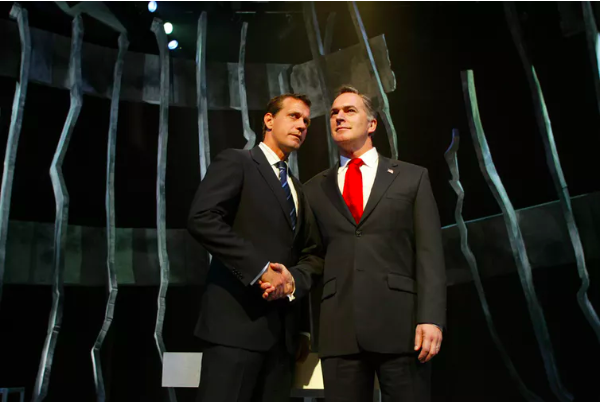
(L to R) Rhys Muldoon as Tony Blair and Greg Stone as George W. Bush during a 2005 media call for Neil Armfield’s play Stuff Happens. STR/AAP Image
What Makes It Work?
To achieve these benefits requires more than professional skill, of however high an order. It requires intellectual and emotional engagement of the deepest and most personal kind.
It requires investigation into the intentions and values of a play script to find out not only whether it “works” but why it exists in the first place, what it is trying to say or show. Without this we are, though we may not realize it, staging the same play over and over again, reducing the diverse contours of a fervent medium down to our own quotidian concerns.
At some point, we need to depart from known outcomes and strike out on our own. Only in this way can we participate in drama’s journey of discovery, as a culture seeking to contribute to its myriad means of expression. However much we admire the old we have to create the new to appreciate the old as it was when first created.
The Risks of The New
Here a different risk profile comes into view.
A balance between old and new in the repertoire is clearly a sensible thing, given that these are not absolute qualities – that there is a lot of the old in the new, and something new in every production of the old. But as types of activity, as arcs of commitment, they are poles apart.
For the new is wholly unknown and the joy and terror that results from this induces a singular appreciation of theatre’s horizons. This is a key point. A commitment to a national drama is not just about the results. It is about the altered mindset that comes when our own imagination is set free to soar. Then everything is changed, not only the kinds of plays selected but the means mobilized to make those selections, and the values used to judge the results.
Just as in life we feel differently driving through the countryside we have explored on foot, so creating our own drama enriches the spirit of an entire theatre culture.
If ever an example existed of this, it is Australia.
For upwards of 60 years after federation, the country struggled with the idea of a national drama, failing to appreciate its signal qualities as a change agent. The adaptation debate reflects these historical fears – that the country could slide back into a branch town mentality, losing not simply its “stories” but its capacity to frame reality according to its own view of life.
Why should playwrights have a leading role in all this? In many ways, they don’t. But writing does. It is the function, not the personalities, that matters and part of my argument is that while writers aren’t special people they are charged with an especially demanding task and this deserves our recognition and support, even as we acknowledge other artists and their important roles.
This is different from saying that playwrights should be at the apex of theatre or have the final say in all aspects of production or that all theatre should be created in the same way. This is patently false, and today’s industry is full of writers in varied work situations – cooperative, collaborative and cross-artform – and projects re-routing the literary component of the theatre-making processes.
But this is not a recent occurrence.
Different ways of working have been a reality in theatre for as long as theatre has been a reality. Diversity does not need to be defended. Rather the problems facing particular approaches need to be better understood. Playwriting is an intense expression of certain challenges and capacities without which a crucial articulation of the dramatic imagination cannot take place. It is a concentrated form of the “encounter with the new”, and I return to my point about language.
Language says things, committing those who open their mouths to its specific propositions. It can be ambiguous, poetic, allusive, elliptical. But it can also array to precise effect. We know things in drama with clarity and force because they are expressed in words and its devastating twin, silence.
This makes drama a serious public art form, a shaper of manners and morals, a way a society talks to itself in the night, and beyond the night.
This is an extract from Platform Papers 39, The Retreat Of Our National Drama, by Julian Meyrick. It is published today by Currency House.
This post originally appeared on The Conversation on May 14, 2014, and has been reposted with permission.
This post was written by the author in their personal capacity.The opinions expressed in this article are the author’s own and do not reflect the view of The Theatre Times, their staff or collaborators.
This post was written by Julian Meyrick.
The views expressed here belong to the author and do not necessarily reflect our views and opinions.

